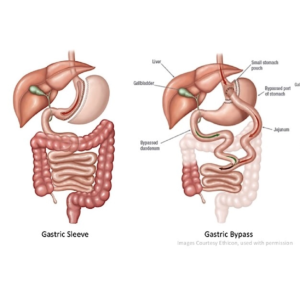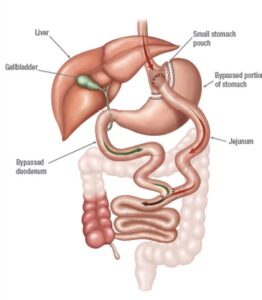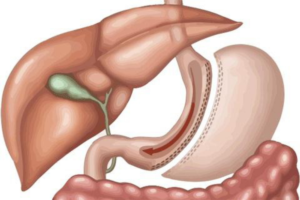Bariatric Surgery / Weight Loss Surgery: a better term might be “Metabolic Surgery”
If you need to lose a significant amount of weight to improve your overall health and stave off weight related illnesses like type 2 diabetes, an experienced bariatric surgeon Dr. Rick Fermelia can help. Dr. Fermelia specializes in minimally invasive surgical weight loss procedures with an overnight hospital stay. These include the popular gastric sleeve and the “gold standard” gastric bypass surgery. To learn more about your options, call Heartland Surgical in Lincoln, Nebraska or book an appointment online today.

What is Bariatric Surgery?
“Bariatric” is an English word that describes a field of medicine that deals with weight loss, weight control, and obesity treatment. “Bariatric” is combined using three different root origins: bari– from Greek (also, baros), meaning heavy weight, burden, or load. The second root, iatr, comes from Greek iatrikos/iatros which describe physicians and treatment, and the suffix, ic, means pertaining to. Bariatric means “pertaining to weight treatment”.
Bariatric surgery is often called “weight loss surgery” but because it definitely causes weight loss, but… it also profoundly effects metabolism and does much more than weight loss. It puts weight related diseases into remission. I think the best term is “Metabolic Surgery”.
Bariatric surgery, in part, aids with weight loss by restricting the amount of food the stomach can hold. The great thing is that the patient feels FULL on a small amount of food. What may be more important in producing weight loss is that Bariatric Surgery changes a person’s METABOLISM, that is why it is often called “Metabolic Surgery”. A change in metabolism creates several changes in the way gastrointestinal hormones and other systemic hormones that also work to add to the satiety or “hunger satisfaction” from the food that is eaten and to increase the metabolic rate. This metabolic change creates weight loss. Medical problems associated with obesity respond to this change in gastrointestinal hormones and other systemic hormones. We often call weight related diseases “metabolic diseases”. Metabolic diseases include diabetes type 2, prediabetes, high cholesterol, high triglycerides, high blood pressure, fatty liver, heart disease, vascular disease, etc.
Normal dieting causes a decrease in metabolism, but after metabolic surgery there is a paradoxical metabolic response that creates incredible aggressive weight loss in the first 6-9 months that plateaus at the correct place, giving the patient a new metabolic “set point”.
There are a couple types of laparoscopic bariatric surgery available at Heartland Surgical, including:
– Gastric bypass
– Gastric Sleeve
You need an expert like Dr. Fermelia help you to decide between a gastric sleeve or a gastric bypass. Dr. Fermelia will help you determine the best surgical weight loss option for you based on your needs and medical history.
What is gastric sleeve?
Gastric sleeve surgery offers effective long-term weight loss by restricting the amount of food your stomach can hold and by changing your metabolism. Dr. Fermelia makes a tube out of the stomach and removes about 2/3 of the stomach. The remaining stomach is about the size of a medium banana (100 to 150 ccs or 4-6 ounces). The new stomach is considerably smaller than your natural stomach, allowing you to consume smaller meals and fewer calories, yet still be satisfied. Long lasting metabolic changes are created by changing the way gastrointestinal hormones respond to the food you eat. Changes in gastrointestinal and systemic hormones literally affect the appetite and metabolic control areas in your brain for the long term.
What is Gastric bypass?
Gastric bypass surgery offers effective long term weight loss by restricting the amount of food your stomach can hold and by changing metabolism. Dr. Fermelia creates a small stomach pouch, dividing the top of your stomach from the rest of the stomach (this is why it is called a gastric bypass – it bypasses most of the stomach). The upper pouch is redirected to the small intestine. The new stomach is considerably smaller than your full stomach, allowing you to consume smaller meals and fewer calories, yet still be satisfied. Long lasting metabolic changes are created by changing the way gastrointestinal hormones respond to the food you eat. Changes in gastrointestinal and systemic hormones literally affect the appetite and metabolic control areas in your brain for the long term.
How is a sleeve gastrectomy different from a gastric band?
A sleeve gastrectomy is a laparoscopic procedure that involves removing 60 to 80% of the stomach. The remaining portion is banana-shaped and holds much less food than your full stomach. There is a definite metabolic change that occurs with the gastric sleeve that does not occur with the lap band. An adjustable gastric band doesn’t require the removal of your stomach. Instead, an inflatable band is placed around the upper part of your stomach to create a pouch. The new pouch can only hold a small amount of food, satisfying your hunger through restriction.With a sleeve or a band, you can’t consume a large number of calories, yet you are satisfied on a small meal, ensuring effective weight loss.Unlike the gastric band, with the sleeve, there is a durable metabolic change that continues to contribute to small meal satisfaction. This metabolic change and the weight loss leads to improved management or the prevention of certain medical conditions like type 2 diabetes. The gastric band improves weight related diseases through weight loss alone.
How is a sleeve gastrectomy different from a gastric bypass?
A sleeve gastrectomy is a laparoscopic procedure that involves removing 60 to 80% of the stomach. The remaining portion is banana-shaped and holds much less food than your full stomach. The gastric bypass is the “gold standard” operation that has been around for a long time and is tried and true. It is proven to be safe and very effective. The gastric bypass is a procedure that involves making a small pouch of the upper part of the stomach that “bypasses” the lower stomach. It reroutes the pouch to the intestines, which augments the metabolic effect of the surgery.
There is a definite metabolic change that occurs with BOTH gastric sleeve and gastric bypass. It is agreed by most bariatric surgeons that the metabolic change with the gastric bypass is more profound, the weight loss is a little more, and the resolution of weight related diseases is better. A gastric bypass doesn’t require the removal of the stomach. The gastric bypass is an excellent choice in patients with bad GERD or heartburn. With both operations, the new pouch can only hold a small amount of food, satisfying your hunger with smaller meals. With both sleeve and bypass there are metabolic changes (through changing the way that gastrointestinal hormones work) that continue to contribute to hunger satisfaction with small meals.
To learn more about your surgical and medical weight loss options schedule a consultation with Dr. Fermelia by calling the office directly, or send a quick email and we will call you.
Related Posts
Bariatric Surgery / Weight Loss Surgery: a better term might be “Metabolic Surgery”
If you need to lose a significant amount of weight to improve your overall health...

